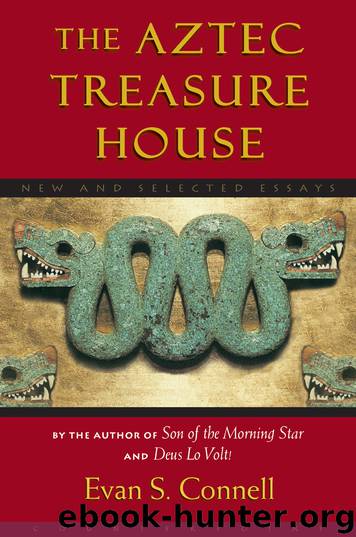Aztec Treasure House by Evan Connell

Author:Evan Connell
Language: eng
Format: epub
Published: 2018-12-27T16:00:00+00:00
2
Eca Suthi . . .
I N 1828 A PEASANT WHO WAS plowing on the Italian estate of Lucien Bonaparte, Napoleon’s brother, crashed through the roof of an Etruscan burial vault. A bailiff was ordered to investigate, and what he saw underground promptly caused Lucien to start raking the countryside for more tombs. Hundreds were found and looted, yielding thousands of painted dishes, statuettes, jewels, rings, bracelets, and so on. The Vulci necropolis, from which Bonaparte recovered most of this treasure, is thought to have given up more valuables than any other ancient site with the exception of Pompeii.
News of the Vulci bonanza whistled through Italy and across Europe while Lucien Bonaparte’s neighbors began to contemplate their own fields with deep interest. As a result, more tombs were ripped open and stripped of marketable merchandise, and Prosper Mérimée felt inspired to write The Etruscan Vase. The vase that excited him was not Etruscan, it happened to be Greek, either imported or manufactured in a south Italian Greek pottery shop; but Mérimée did not know this, for which we may be mildly grateful. Le Vase Étrusque is not classified as a masterpiece but we need all the literature we can get, even if it’s written under a misapprehension.
One by one the sites and the important relics were catalogued, scholarly papers rustled, and archaeologists took to quarreling over the debris. They still quarrel, mostly because the language cannot quite be understood and because nobody has proved beyond doubt where the Etruscans came from.
At present we have two legitimate theories concerning their homeland, and a third theory which once was greeted with respect but now is not. Wherever they originated, these people dominated the central Mediterranean for several centuries. We are told by Livy that Etruria’s renown “filled the lands and the waters from one end of Italy to the other, from the Alps to the Straits of Messina.”
Herodotus thought they emigrated from Asia Minor:
“During the reign of Atys, son of Manes, there was famine throughout Lydia. For a while the Lydians persisted in living as they always had, but when the famine lengthened they looked for a way to alleviate their misery—some suggesting one thing, some another. At this time they invented dice games, knucklebone games, handball games, and other games—except draughts, which they did not invent. They would play all day for two days in order to distract themselves and on the third day they would eat. For eighteen years they lived like this. . . .”
At last, continues Herodotus, the king divided his subjects into two groups and chose by lot which would remain in Lydia and which must go in search of a new home. The king himself remained, while those who were to leave he put in charge of his son Tyrsenos. Then all those who were departing went down to Smyrna where they built ships, and after loading the ships with their possessions they sailed away and “passed by many nations in turn” until they reached the land of the Umbrians.
Download
This site does not store any files on its server. We only index and link to content provided by other sites. Please contact the content providers to delete copyright contents if any and email us, we'll remove relevant links or contents immediately.
| Diaries & Journals | Essays |
| Letters | Speeches |
The Rules Do Not Apply by Ariel Levy(4969)
Bluets by Maggie Nelson(4556)
Too Much and Not the Mood by Durga Chew-Bose(4348)
Pre-Suasion: A Revolutionary Way to Influence and Persuade by Robert Cialdini(4232)
The Motorcycle Diaries by Ernesto Che Guevara(4101)
Walking by Henry David Thoreau(3962)
Schaum's Quick Guide to Writing Great Short Stories by Margaret Lucke(3381)
The Daily Stoic by Holiday Ryan & Hanselman Stephen(3322)
What If This Were Enough? by Heather Havrilesky(3311)
The Day I Stopped Drinking Milk by Sudha Murty(3197)
The Social Psychology of Inequality by Unknown(3031)
Why I Write by George Orwell(2954)
Letters From a Stoic by Seneca(2799)
A Short History of Nearly Everything by Bryson Bill(2698)
A Burst of Light by Audre Lorde(2607)
Insomniac City by Bill Hayes(2558)
Feel Free by Zadie Smith(2481)
Upstream by Mary Oliver(2390)
Miami by Joan Didion(2368)
